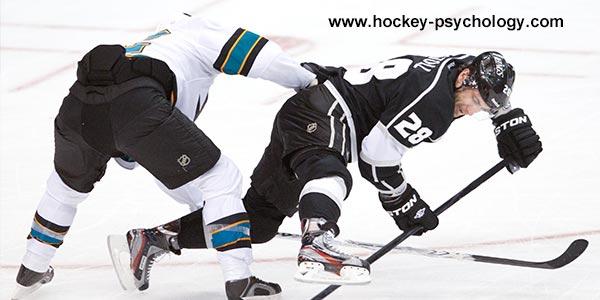
Mental Training Helps Your Hockey Career
Does mental training work? This is the one question that will determine your level of play throughout the season.
If you believe mental skills training is not effective, you might not bother with doing mental training.
If you believe mental skills have a beneficial effect on your game, you will seek out resources to train your mind as well as your body.
Your answer to this question may very well be the most important decision in your hockey career.
A very poignant question, regarding the mental component of sport, was asked in our Mental Game of Hockey Survey.
“What things can I bring to the table from the mental side and how will they positively correlate to my play?”
The short answer to this question is, “Confidence, Focus, and Trust!”
First, let’s look at some negative circumstances that you may experience and how mental skills training can counteract those problematic areas:
1. Focus – Bouncing back from mistakes requires that you focus on the play right in front of you. For example, after giving up an easy goal, you can get caught up playing that mistake over and over in your mind for the remainder of the game. The inability to re-focus will lead you to mistakes as the game progresses. Learning re-focusing strategies and applying them after making mistakes will make it tremendously easier for you to overcome mistakes in games.
2. Managing Emotions in Games – How many times has bad officiating or cheap shots by your opponent caused you to lose your composure? After a cheap shot, you can become so hyped up that you retaliate and are penalized putting your team at a disadvantage. A relaxation strategy can help you maintain your poise and turn that anger into motivation.
3. Goal Setting – Setting goals, early in the season, is a strategy that keeps you motivated to develop your skills, speed, agility, strength, skating and mental game throughout the season, even during rough patches. Your hockey season will have its ups and downs. Goal setting will keep you on the path of progress.
These examples are a small portion of mental skills that can improve your performance on the ice.
Other mental skills include: working through injury, overcoming adversity, pregame mental preparation, playing with the lead, dealing with raucous spectators, breaking out on slumps, effective communication with coaches and teammates, performing under pressure and many, many more.
Equipping yourself with mental skills provides you with the tools needed to overcome obstacles, rise to challenges and be your best on a consistent basis and gives you a big advantage over the competition.
Applying Mental Skills to Games
It is not enough to learn practical mental skills, you need to develop mental skills, such as refocusing, in practice and via repetition on a consistent basis. So first you want to take these skills to practice.
The next step if to apply to your game. I suggest you apply them to your pregame warm up. I’ll discuss refocusing…
First, remind yourself of what can get you off task during a game – such as a cheap shot, the crowd, the bench, dwelling on mistakes, etc.
Next, be ready to refocus your mind when you find your mind drifting or dwelling on these distractions. This mean quickly changing your focus to the next play.
Related Articles on Hockey Mental Game:
- How to Create a Winning Mindset for Hockey
- How Hockey Players Grow into Their Potential
- 5 Components of Managing Injuries
*Subscribe to The Sports Psychology Podcast on iTunes
*Subscribe to The Sports Psychology Podcast on Spotify
Mental Coaching Programs for Hockey
Our mental game coaching programs for hockey players helps athletes improve confidence, concentration, let go of errors quickly, and stay composed during crunch-time. Read more about sports psychology for hockey players at Peaksports.com
Please contact me by phone at 888-742-7225 or by filling out the webform below to learn more about our personal mental training programs for hockey players or teams:
Leave a Reply